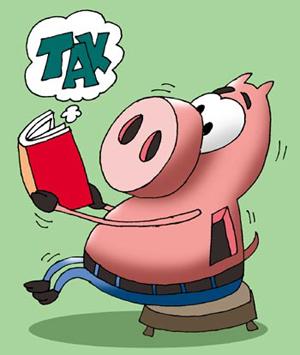
PTS may help professionals and freelancers to lower their tax liability, reports Tinesh Bhasin.
Illustration: Uttam Ghosh/Rediff.com
This assessment year onwards, professionals with a turnover of Rs 50 lakh or less can file returns under Section 44AA (1) of the presumptive taxation scheme, PTS.
They need to consider 50 per cent of the gross turnover as profit and pay tax depending on their tax slab.
Earlier, this was available to small businesses only.
The most attractive part of the scheme is that assessees don't need to maintain books of accounts or related paperwork, or get their books audited.
If all the money received in bank accounts is accounted for, they don't need to maintain receipts.
But if professionals earn more than Rs 10 lakh for the services provided by them, they will need to compulsorily pay service tax, which means doing away with all the paperwork won't be possible.
"The purpose of the scheme is to provide relief to smaller professionals from the hassle of maintaining paperwork. But the compliance norms for service tax are more rigorous than for income tax," says Suresh Surana, founder, RSM Astute Consulting Group.
"The assessee will need to maintain detailed records if s/he falls under the ambit of service tax," he adds.
Surana points out the new goods and services tax laws have a similar scheme for small businesses.
They need to pay between 0.5 per cent and 2.5 per cent tax, depending on the business, without the hassle of maintaining a detailed record. But service providers are kept out of it.
There's a list of notified professions whose practitioners can opt for the presumptive taxation scheme.
These include legal, medical, engineering, architectural, accountancy, technical consultancy and those involved in film-related activities, such as actor, cameraperson, director, music director, and so on.
Tax experts say filing returns under presumptive taxation will decrease tax outgo for most.
If your total turnover is, say, Rs 25 lakh, you need to consider profits at Rs 12.5 lakh (50 per cent of the turnover).
For professionals this is reasonable as there's little input cost, say tax experts.
If you are opting for presumptive taxation, you don't need to worry about compliances related to tax deduction at source and cash payments.
The individual can also avail of deductions under income tax Chapter VI-A, which include Section 80C, Section 80D, housing loan, and so on.
In certain scenarios, however, it will make sense to file returns as a regular business owner, such as if you wish to deduct expenses and claim depreciation.
"If you have losses and you want to carry them forward, it makes sense to opt for ITR-3. You will need to get your books audited and carry forward the loss for seven years," says Archit Gupta, founder and chief executive officer, ClearTax.com.
"Also, you should not opt for PTS if your expenses are more than 50 per cent of the turnover -- cases where a professional has bought expensive equipment on loan and wants to claim deduction and depreciation," says Gupta.
Adds Surana: "Do remember that from financial year 2017-2018, the maximum depreciation rate has come down to 40 per cent. Items that were available for depreciation at 100 per cent and a computer that could be depreciated at 60 per cent will now be subject to maximum depreciation at 40 per cent only."











